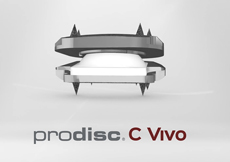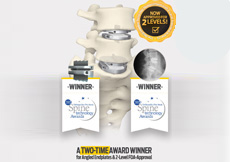Lumbar Laminectomy

Lumbar laminectomy, also known as decompression laminectomy, is a spinal surgery performed to relieve excess pressure on the spinal nerve(s) in the lumbar (lower back) region.
Lumbar Foraminotomy

A lumbar foraminotomy is a surgical procedure that decompresses the spinal nerves by removing bone and other tissues that obstruct the neural foramen.
Lumbar Artificial Disc Replacement

Lumbar artificial disc replacement is a surgical procedure employed to remove and replace a damaged or worn out disc in the lumbar or lower part of your spine that has become painful and debilitating with an artificial or synthetic disc.
Lumbar Decompression

Lumbar decompression is a surgical procedure performed to relieve pressure over the compressed nerves in the lower spine (lumbar region).
Lumbar Sympathetic Block

A lumbar sympathetic block is an injection of a local anesthetic and steroid that is injected into or around the sympathetic nerves to block the transmission of pain impulses from the legs or lower back, thereby relieving pain.
Transforaminal Lumbar Interbody Fusion (TLIF)

Transforaminal lumbar interbody fusion (TLIF) is a type of spinal fusion procedure in which bone graft is placed between the affected vertebrae in the lower back (lumbar) region through an incision on the patient’s back.
Posterior Lumbar Fusion

Spinal fusion, also called arthrodesis, is a surgical technique used to join two or more vertebrae (bones) within the spine. Lumbar fusion is the fusion the vertebrae in the lumbar portion of the spine (lower back).
Posterior Lumbar Interbody Fusion

Spinal fusion is a surgical technique that joins two or more vertebrae in the spine to minimize the pain caused by the movement of these vertebrae.
Lumbar Endoscopic Discectomy

Lumbar endoscopic discectomy is a minimally invasive surgical procedure to treat a herniated or ruptured disc and relieve pressure on the spinal nerves.
Lower Back (Lumbar) Surgery

Low back pain usually does not require surgery. However, surgery may be beneficial for persistent pain, spinal instability, weakness or numbness in the legs or feet, and impaired bowel or bladder function.
Minimally Invasive Lumbar Discectomy

Lumbar discectomy is a spinal surgery that involves the removal of the damaged intervertebral disc(s) to relieve pressure on the spinal nerves (decompression) in the lumbar (lower back) region, which forms the lower portion of the spine and comprises of five vertebrae (L1-L5).
Anterior Lumbar Interbody Fusion

Anterior lumbar interbody fusion (ALIF) is a surgery performed to correct spinal problems in the lower back. The surgery can be implemented either as an open surgery or minimally invasive technique.
Minimally Invasive TLIF

Transforaminal lumbar interbody fusion (TLIF) is a minimally invasive fusion of the vertebrae of the lumbar region (lower back). It is designed to provide stability to the spine and treat back and leg pain.
Spinal Fusion

Spinal fusion is the surgical technique of combining two or more vertebrae. A fusion of the vertebrae involves the insertion of secondary bone tissue obtained either from an autograft (tissues from your own body) or allograft (tissues from another person) to enhance the bone healing process.
Spinal Decompression

Spinal decompression is a treatment to relieve pressure on one or many “pinched nerves” in the spinal column. It can be achieved either surgically or by non-surgical methods.
Vertebroplasty

Osteoporosis is a “silent” disease characterized by weakening of bones, making them more susceptible to fractures, typically in the hip and spine
Laminectomy

Laminectomy refers to the removal or cutting of the lamina (roof) of the vertebral bones to provide space for the nerves to exit from the spine.
Kyphoplasty

Balloon kyphoplasty is a spine surgery that relieves back pain caused by a vertebral compression fracture. The aim of balloon kyphoplasty is to relieve pain, stabilize the fracture and restore the vertebral body height.
Facet Injections

The facet joints are the tiny joints situated at the upper and lower part of each vertebra, connecting one vertebra to the other.
Cervical Arthroplasty

Arthroplasty is a surgical procedure to restore joint function by replacing a damaged joint with an artificial joint called a prosthesis.
Complex Spinal Surgery

Complex spine surgery is a type of back surgery involving a fusion of six or more vertebrae. The vertebrae are a series of small interlocking bones extending from the skull to the pelvis (hip) to form your spinal column or backbone.
Complex Spine Surgery

Complex spine surgery is a procedure that involves six or more vertebrae of the spinal column, requiring six or more hours of surgery to correct a spinal deformity.
Cervical/Lumbar Traction

Excessive pressure on the spine from injury or stress may cause discs present between the vertebrae to herniate. Nerves exiting and entering the spine may become compressed by these herniated discs.
Cervical Laminectomy

Degeneration of the facet joints and intervertebral discs results in narrowing of the spinal canal known as spinal stenosis. In addition, the arthritic facet joints become bulkier and consume the space available for the nerve roots.
Cervical Foraminotomy

Cervical foraminotomy is a surgical procedure performed to relieve the symptoms of a pinched or compressed spinal nerve by enlarging the neural foramen, an opening for the nerve roots to exit the spine and travel through the body.
Posterior Cervical Fusion

Posterior cervical fusion (PCF), a surgical procedure performed through the back of the neck, involves joining or fusing two or more damaged cervical vertebrae. The fusion of vertebrae is also known as arthrodesis.
Cervical Laminoplasty

Degeneration of the facet joints and intervertebral discs that connect vertebrae to one another results in narrowing of the spinal canal, known as spinal stenosis. In addition, the arthritic facet joints become bulkier and consume the space existing for the nerve roots.
Minimally Invasive Spine Surgery

Minimally invasive spine surgery (MISS) is the latest technology available to perform spinal surgeries through small, less than one-inch-long incisions.
Endoscopic Spine Surgery

Endoscopic spine surgery is a minimally invasive spine surgery that uses specialized video cameras and instruments to remove the herniated disc through very small incisions.
Removal of Facet Joint Cyst

Facet joint cysts, also called synovial cysts, are benign, fluid-filled sacs that develop due to degeneration of the facet joints of the spine.
Lower Back Pain Surgery

Lower back pain can be disabling; however, most cases heal with time (2-12 weeks) and with conservative therapy.
Spinal Tumor Surgery

A spinal tumor is an abnormal mass of tissue surrounding or found within your spinal cord and/or spinal column.
Posterior Cervical Decompression

Posterior cervical decompression is a surgical procedure performed through the back of the neck to relieve pressure over compressed nerves in the cervical spine region caused by inflamed spinal tissue or nerves, by removing portions of the cervical vertebrae.
Posterior Cervical Foraminotomy

Posterior cervical foraminotomy is a surgical procedure performed through the back of the neck to relieve symptoms of a pinched or compressed spinal nerve by enlarging the neural foramen, an opening for the nerve roots to exit the spine and travel through the body
ExcelsiusGPS Robotic Navigation

ExcelsiusGPS® Robotic Navigation system is the latest technology designed to integrate the benefits of robotics and navigation into one platform to provide minimally invasive spine surgery and optimize patient care with improved accuracy and safety.
Posterior Thoracic Fusion

Posterior thoracic fusion is a spinal fusion procedure performed through an incision on the back (posterior) of the patient in which two or more vertebrae of the thoracic spine (mid back) are joined together, eliminating any movement between them.
Oblique Lumbar Interbody Fusion (OLIF)

Lumbar interbody fusion involves the removal of the damaged intervertebral disc and fusion of the two adjacent spinal vertebrae into one bone. When the bones do not move, they do not cause any pain.
Thoracic Corpectomy

Thoracic corpectomy is a surgical procedure performed to relieve pressure on a nerve at the thoracic region (upper and middle back) by removing the source of the compression.
Surgery for Scoliosis

Surgery for scoliosis is recommended when the spinal curvature is severe and is either worsening or is a cause of severe pain or difficulty in breathing. The surgery is aimed at rectifying the spinal curvature, stabilizing the spine and preventing it from worsening.
Medial Branch Block Injections

A medial branch block is an injection of a local anesthetic administered near the medial branch nerves to temporarily block the pain signal carried from the facet joints of the spine to the brain.
Spine Osteotomy

Spine osteotomy is a surgical procedure in which a section of the spinal bone is cut and removed to allow for correction of spinal malalignment.
Lumbar Spinal Bracing

Lumbar braces are external devices used to restrict the movement of the lumbar spine and provide support and stability to the lower back region, to relieve back pain and promote healing after surgery or injury.
Fracture Stabilisation

A spinal fracture refers to a break in any of the bones that make up the spine. It can occur due to trauma such as a traffic accident, fall from a significant height or weakening of the bones due to osteoporosis or a tumor.
Spinal Infection Debridement

The spine is made up of bones called vertebrae which surround and protect the spinal cord. These are separated by intervertebral discs which provide cushioning between the vertebral bones.
Spinal Infection Decompression

The spine is made up of bones called vertebrae which surround and protect the spinal cord. These are separated by intervertebral discs which provide cushioning between the vertebral bones.
Spinal Infection Stabilisation

The spine is made up of many bones called vertebrae which surround and protect the spinal cord. Intervertebral discs between the vertebral bones provide cushioning.
Cervical Facet Blocks

A facet block is a procedure in which a combination of a local anesthetic and a corticosteroid is injected into a facet joint. A cervical facet block prevents the transmission of pain signals from the neck.
In-Office Cervical Injections

In-office cervical injections are administered in a medical office or clinic setting to provide relief from pain or inflammation affecting the neck and upper back.
Piriformis Muscle Injection

The piriformis muscle is present in the buttocks, connecting the sacrum to the outer surface of the hip. This muscle enables us to walk and run.
Disc Decompression

Acute or chronic injury can cause a spinal disc to herniate or rupture. The damaged disc may compress against the spinal cord or the nerves that branch out through the vertebral bones, leading to pain, loss of sensation and/or motor function in the part of the body supplied by the nerve.
Endoscopic Rhizotomy

Endoscopic rhizotomy is a minimally invasive procedure to destroy nerves that transmit pain impulses from the facet joints of the spine.
Outpatient Spine Surgery

Outpatient spine surgery is an operative procedure that does not require an overnight stay at the hospital. It is also called ambulatory or same-day surgery.
Cervical Spine Fusion

Your spine consists of a spinal cord supported by a series of interlocking bones called vertebrae. The cervical spine is the upper part of the spine situated in the neck region. It has seven vertebrae, separated and cushioned by spongy intervertebral discs.
Posterior Cervical Laminectomy and Fusion

Posterior cervical fusion (PCF), a surgical procedure performed through the back of the neck, involves joining or fusing two or more damaged cervical vertebrae. The fusion of vertebrae is also known as arthrodesis.
Image-Guided Spine Surgery

Imaging techniques such as computed tomography and fluoroscopy may be integrated into the system to facilitate pre-operative planning of the surgery, where a series of images taken before the surgery are displayed on a screen, with which your surgeon matches his/her moves intraoperatively.
Intracept - Basiventral Nerve Ablation

Intracept is a minimally invasive procedure developed by Relievant to treat chronic low back pain by targeting the basivertebral nerve.
Lumbar Facet Block

A facet block is a procedure in which a combination of a local anesthetic and a corticosteroid is injected into a facet joint. A lumbar facet block prevents the transmission of pain signals from the lower back.
Lumbar Medial Branch Block

A medial branch block is a procedure in which a mixture of a local anesthetic with or without a corticosteroid is injected near the medial branch nerves supplying a facet joint. A lumbar medial branch block prevents the transmission of pain signals from the lower back.
Minimally Invasive Lumbar Decompression

Minimally invasive lumbar decompression or mild® is a procedure developed by Vertos Medical to treat lumbar spinal stenosis by relieving pressure on the spinal nerves.
Discography

Discography or a discogram is a procedure to evaluate back pain. It helps identify a painful spinal disc.
In-Office Lumbar Injections

In-office lumbar injections are steroid shots administered to you in your physician’s clinical or office setting to relieve low back pain.
Artificial Cervical Disc Replacement

Artificial cervical disc replacement is a spine surgery to replace a degenerated (deteriorated) disc in the neck with an artificial disc. The artificial disc, like the natural healthy disc, is used to replace the degenerated disc.
Transforaminal Epidural Block

An epidural block or epidural spinal injection is a non-surgical treatment option for relieving back pain and other symptoms.
Cervical Corpectomy and Strut Graft

The cervical spine comprises of the first 7 vertebrae of the spinal column. The vertebrae are separated from one another by shock-absorbing pads called intervertebral discs
Minimally Invasive Cervical Discectomy

A cervical discectomy or decompressive spinal procedure is an operative procedure that relieves pressure on the spinal nerves and/or spinal cord by partially or completely removing the intervertebral disc that is herniated and/or bony material (bone spur).
Anterior Cervical Discectomy with Fusion

Anterior cervical discectomy with fusion is an operative procedure to relieve compression or pressure on nerve roots and/or the spinal cord due to a herniated disc or bone spur in the neck. The vertebra is approached from the from (anterior) of your neck.
Lumbar Epidurals

Lumbar epidurals are injections to treat and relieve low back pain. A lumbar epidural involves injecting a local anesthetic and an anti-inflammatory steroid into the epidural space of the lower spine (lower back) to reduce inflammation causing the pain.
Thoracic Vertebroplasty

Thoracic vertebroplasty is a minimally invasive procedure performed to reduce or eliminate pain caused by vertebral compression fractures. It stabilizes the fracture and prevents further collapse of the vertebra, averting deformity.
Superion

Superion®, a product of VertiFlex, Inc., is an FDA-approved, minimally invasive procedure to treat lumbar spinal stenosis.
Spinal Nerve Blocks

A spinal nerve block is the injection of an anesthetic and steroid medication around the spinal nerve root to diagnose or treat pain.
Spinal Facet Rhizotomy

Spinal facet rhizotomy is a minimally invasive procedure to destroy nerves that transmit pain impulses from the facet joints of the spine.
Thoracic Facet Joint Injection

Facet joints are small joints present between the vertebral bones including the vertebral bones of the thorax (upper back). The bones in these joints are covered by cartilage and a capsule filled with synovial fluid surrounds the joint reducing friction.
Lumbar Discectomy

A lumbar discectomy is a surgical procedure performed to treat a herniated or ruptured disc and relieve pressure on the spinal nerves.
Cervical Epidurals

A cervical epidural is an injection of medication into the epidural space in the lower section of the cervical region to provide relief from pain or inflammation affecting the neck and upper back.
Percutaneous Vertebroplasty

Percutaneous vertebroplasty is a minimally invasive procedure to treat fractures of the spinal vertebral bones. During this procedure, your doctor inserts a needle through your skin into the fractured vertebra and injects bone cement.
Non-Surgical Treatment for Disc Disease

The spinal column consists of vertebral bones stacked one on top of the other, surrounding and protecting the spinal cord. Soft cartilaginous discs present between the vertebrae support the spine, act as cushions against stress and permit spine mobility.
Lumbar Fusion

Spinal fusion, also called arthrodesis, is a surgical technique used to join two or more vertebrae (bones) within the spine. Lumbar fusion is the procedure of fusing the vertebrae in the lumbar portion of the spine (lower back).
Posterolateral Lumbar Fusion

Posterolateral lumbar fusion is a surgical technique that involves correcting spinal problems from the back of the spine by placing bone graft between segments in the back and leaving the disc space intact.
Lumbar Corpectomy and Fusion

Lumbar corpectomy and fusion is a surgical technique performed to remove the vertebral bone or disc material between the vertebrae to alleviate pressure on the spinal cord and spinal nerves (decompression) in the lumbar (lower back) region.
Lumbar Facetectomy and Foraminotomy

Facetectomy and foraminotomy are the most common spinal surgical procedures recommended for chronic pain due to spinal nerve compression. Lumbar foraminotomy is a decompression surgery involving the removal of bone and tissue obstructing the neuroforamen to release the pressure on the spinal nerve roots.
Lumbar Interbody Fusion

Lumbar interbody fusion (LIF) surgery is a surgical technique that involves the removal of a damaged intervertebral disc and the insertion of a bone graft into the disc space created between the two adjoining vertebrae.
Spinal Cord Stimulator

A spinal cord stimulator is a device that sends electrical impulses to the areas of the spinal cord causing pain and interferes with the transmission of pain signals to the brain.
Spine Deformity Surgery

The spine or backbone provides stability to the upper part of the body. It helps to hold your body upright. It consists of several irregularly-shaped bones called vertebrae appearing in a straight line.
Prodisc C – Cervical Spine Artificial Disc Replacement

Prodisc C is an FDA-approved cervical total disc replacement (TDR) designed to treat degenerative disc disease in the neck.
Prodisc L – Lumbar Spine Artificial Disc Replacement

Prodisc L is an FDA-approved lumbar total disc replacement (TDR) system designed to treat degenerative disc disease (DDD) in the lower back.




